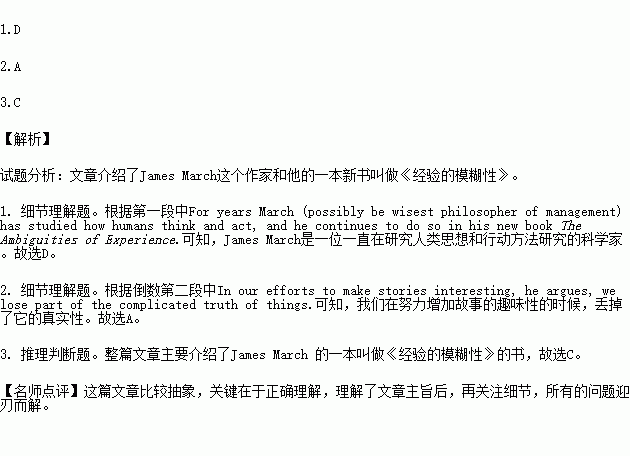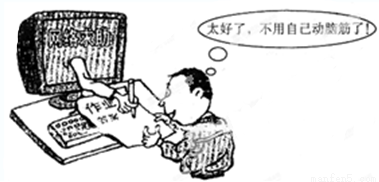题目内容
“Experience may possibly be the best teacher, but it is not a particularly good teacher. ”You might think that Winston Churchill or perhaps Mark Twain spoke those words, but they actually come from James March, a predecessor(前任) at Stanford University and a pioneer in the field of organizational decision making. For years March (possibly be wisest philosopher of management) has studied how humans think and act, and he continues to do so in his new book The Ambiguities of Experience.
He begins by reminding us of just how firmly we have been sticking to the idea of experiential learning: “Experience is respected; experience is sought; experience is explained.” The problem is that learning from experience involves (涉及) serious complications(复杂化), ones that are part of the nature of experience itself and which March discusses in the body of this book.
In one interesting part of book,for example,he turns a double eye toward the use of stories as the most effective way of experiential learning. He says “The more accurately(精确的) reality is presented, the less understandable the story, and the more understandable the story, the less realistic it is.”
Besides being a broadly knowledgeable researcher. March is also a poet, and his gift shines though in the depth of views he offers and the simple language he uses. Though the book is short, it is demanding: Don’t pick it up looking for quick, easy lessons. Rather, be ready to think deeply about learning from experience in work and life.
1.According to the text, James March is ____________.
A. a poet who uses experience in his writing
B. a teacher who teachers story writing in university
C. a professor who helps organizations make important decisions
D. a researcher who studies the way humans think and act
2.What can we learn from Paragraph 3?
A. Stories made interesting fail to fully present the truth.
B. Experience makes stories more accurate.
C. The use of stories is the best way of experiential learning.
D. Stories are easier to understand when reality is more accurately described.
3.What’s the purpose of this text?
A. To explain experiential learning.
B. To describe a researcher.
C. To introduce a book.
D. To discuss organizational decision making.
 阅读快车系列答案
阅读快车系列答案

